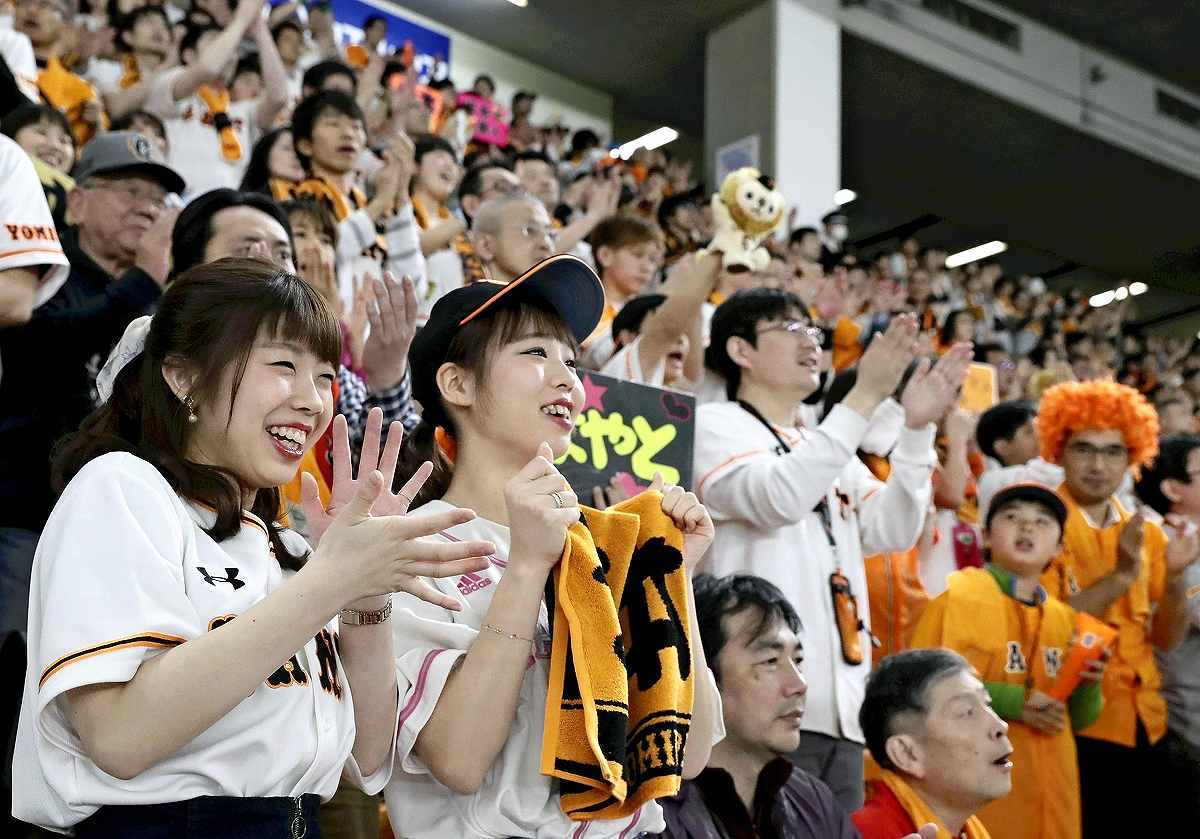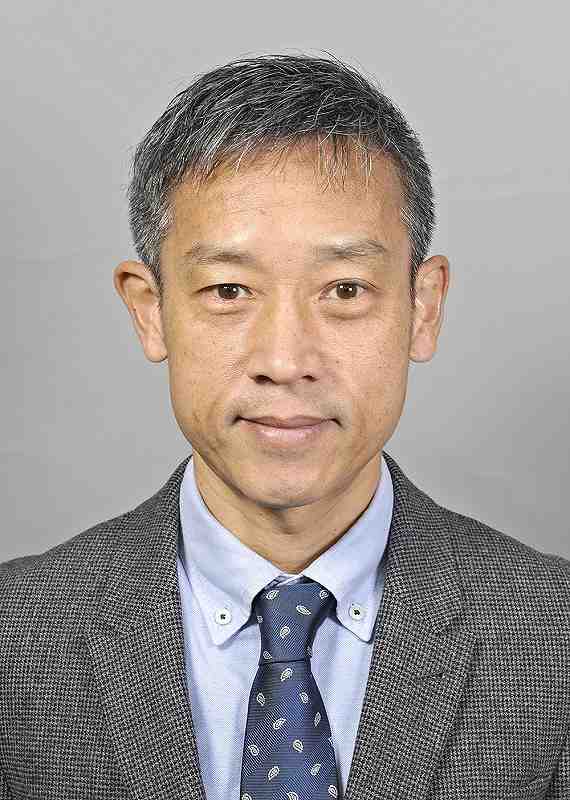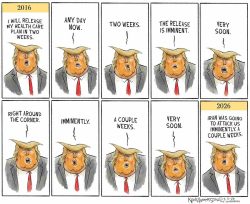
Fans cheer at the 2018 professional baseball season opener in March 2018 at Tokyo Dome. Will these scenes return this season?
8:00 JST, February 18, 2023
Hooray! Vocal cheering is coming back to the Japanese sports world. On Jan. 27, restrictions on spectator numbers and vocal cheering, which had been in place as measures against the novel coronavirus, were lifted. This is a major milestone on the road back to the normalization of society. It is expected to spur economic recovery and vibrant community life through sports events.
The Japanese word “kyushun” means “ball spring.” It is used to describe the start of professional baseball camps and open games, as well as the beginning of the pennant race. J.League soccer also opens its season in spring, but the term is commonly used for baseball, whose professional league has a long history. Japanese people have long felt the arrival of spring when they hear cheering in the stadiums at the start of professional baseball games.
However, the coronavirus disaster changed all that. In professional sports, where the cheers of fans are essential, the Nippon Professional Baseball Organization and the J.League set up a coronavirus liaison conference that has played a major role in preventing infections. The conference has convened 68 times from its inception in March 2020 until November of last year. The team has accumulated knowledge through analysis of infection cases and created guidelines for infection control measures, cheering styles, and other matters. The infection control measures established by the conference served as a model for the Tokyo Olympics and Paralympics held in the summer of 2021. Specifically, the number of spectators was limited, and vocal cheering was banned.
Last season, for the first time in three seasons, professional baseball welcomed spectators from the start of the season with no limit on crowd size. However, vocal cheering continued to be restricted and masks continued to be worn. Thanks to the successful completion of the season, the owners of the 12 baseball teams at their meeting last November confirmed their intention to allow vocal cheering and the use of trumpets, which has become a tradition in Japanese baseball cheering, from 2023.
Meanwhile, the J.League conducted a test project at official games from June to August last year, setting up an area where vocal cheering was allowed, checking operational aspects, and collecting data. Based on the high rate of mask wearing in the area and the fact that there was no significant increase in carbon dioxide concentrations, the J.League concluded that “it has been proven to a certain degree that it is possible to cheer vocally while controlling the spread of infection. In September of last year, the “vocal support area” was maintained at 50% of its capacity, while other areas were eased to 100%.
Looking overseas, American professional sports such as Major League Baseball, the NBA and the NFL, as well as soccer leagues in England’s Premier League and other European countries, had already returned to the style of cheering without masks last season. At the World Cup soccer tournament in Qatar last fall, the four major tennis tournaments, and the World Championships in track and field held in the U.S. state of Oregon, the cheering scene had returned to its pre-pandemic “normal” routine. Therefore, from the perspective of people overseas, the continuation of cautious anti-coronavirus measures for sports cheering in Japan may be considered excessive.
However, the majority of people in Japan still walk outdoors wearing masks wherever they go in the country. This is despite the Japanese government having said that it is not necessary to wear masks outdoors. The reality is that Japanese people’s consciousness of the coronavirus is that high. One can imagine that it was not an easy task for the sports world to bring back cheering in such an environment.
This March, Japan will host the World Baseball Classic (WBC), an international baseball tournament, prior to the start of the professional baseball season. Japan’s representative team, Samurai Japan, has attracted a great deal of attention, with popular players such as Shohei Ohtani, Yu Darvish and Seiya Suzuki, who are active in Major League Baseball in the United States, and Munetaka Murakami, who last season became the youngest player ever to win the triple crown in the hitting category in the Central League of Japanese professional baseball at the age of 22.
A staff member at a sporting goods store in Tokyo welcomed the easing of cheering restrictions ahead of the WBC, saying, “I hope the lifting of the ban on vocal cheering will make the tournament more exciting.” A customer at a “baseball izakaya” in Tokyo said: “Without the vocal cheering, the fun was halved. I can’t wait to go to the stadium and sing the cheering songs.” Atsushi Ihara, director general of the Nippon Professional Baseball Organization, also expressed his delight, saying: “I am very happy. What was a wish last fall is now becoming a reality.”
However, tourists coming to Japan from overseas to watch the WBC and other sporting events need to be careful. Although the ban on vocal cheering has been lifted, the wearing of masks will still remain in place. So, when will the Japanese sports world return to the real “normal” where people can cheer without masks?
One possibility is when the classification of the coronavirus under the Infectious Diseases Control Law is lowered from the current “equivalent to Category II” to Category V, the same as seasonal influenza. Prime Minister Fumio Kishida, who heads the government’s coronavirus task force, has stated that “unless special circumstances arise, it will be classified as a Class V infectious disease from May 8.”
If the novel coronavirus is treated the same as influenza, there is a strong possibility that the field of sports will return to a “pre-corona” state. I look forward to the day when stadiums and arenas in Japan will again have scenes of people cheering with smiles on their bare faces, just as they do in Europe and the United States.
Political Pulse appears every Saturday.

Yuji Kondo
Kondo is a senior writer in the Sports Department of The Yomiuri Shimbun.
Top Articles in Editorial & Columns
-

Riku-Ryu Pair Wins Gold Medal: Their Strong Bond Leads to Major Comeback Victory
-

Reciprocal Tariffs Ruled Illegal: Judiciary Would Not Tolerate President’s High-Handed Approach
-

China Provoked Takaichi into Risky Move of Dissolving House of Representatives, But It’s a Gamble She Just Might Win
-

Flu Cases Surging Again: Infection Can Also Be Prevented by Humidifying Indoor Spaces
-

Japan’s Plan for Investment in U.S.: Aim for Mutual Development by Ensuring Profitability
JN ACCESS RANKING
-

Producer Behind Pop Group XG Arrested for Cocaine Possession
-

Japan PM Takaichi’s Cabinet Resigns en Masse
-

Man Infected with Measles Reportedly Dined at Restaurant in Tokyo Station
-

Israeli Ambassador to Japan Speaks about Japan’s Role in the Reconstruction of Gaza
-

Videos Plagiarized, Reposted with False Subtitles Claiming ‘Ryukyu Belongs to China’; Anti-China False Information Also Posted in Japan

























